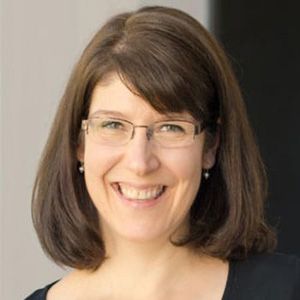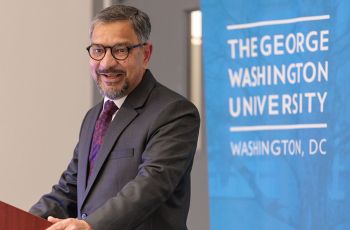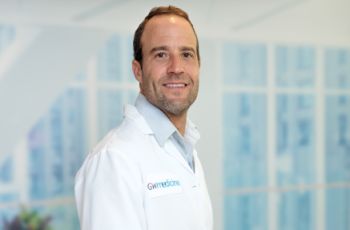
As an epidemiologist, Kim Robien is all about the data. Behind her science is the soul of someone whose direct work with cancer patients motivated her to find the answers to questions that weren’t always easily answered. Kim made it her mission to find the answers and boost the need for supportive care. In this equation, science equals heart.
What’s your story?
I started my career as an oncology dietitian. My patients were asking great questions like what they should eat to help avoid side effects from chemotherapy, how they could improve their chances of being
cancer-free after treatment, what to eat so their blood counts stayed high enough for treatment, and which lifestyle habits they could adopt to help the process along.
We just didn’t have the science to answer those questions and I wanted to fill the gap so I went back to school for my doctoral degree. My research focuses on epidemiology and nutrition science. I’m leading two studies: one that looks at how diet and body composition can be used to minimize treatment- related toxicity and maximize effectiveness of existing cancer treatment regimens, and the other to evaluate how exercise and nutrition interventions can improve patient outcomes.
This work is also personal. My mother has had two different types of cancer and I lost a sister-in-law to a brain tumor about ten years ago.
What gets you out of bed in the morning?
I always laugh when I get this question. I’m a real night owl and not much of a morning person at all. I changed my employment track over the summer to become an associate research professor. Now that I’m solely focused on research, I find myself bounding out of bed — just not early — and excited to get to work. I really, really love collecting and organizing information. That’s what we do as scientists: data collection, data analysis, organizing it and thinking it through, how we talk about data and present it to others.
I’m trained as an epidemiologist and I’ve been working more with bioinformatics. I’m very interested in how we present data in a visually meaningful way. Brooke Burgess and I created the Cancer Epidemiology Shared Resource (CESR) and the GW Cancer Center’s Data Visualizer, which is a tool to visualize population data in our catchment area.
What is that one book that has influenced you the most?
The reality is that I just don’t have a lot of time to read a lot of books, and I hate rereading books or watching movies more than once. If I know the ending, it’s just not exciting for me. It’s more appropriate for me to discuss the genre rather than a specific book. I just love history of science books.
We learn the basics of science in our classes, but to hear the stories of the why is what gets me excited and helps me remember details. Everything falls together. I really like the Mukherjee books: The Emperor of All Maladies and The Song of The Cell.
I love Fred Applebaum’s book, Living Medicine, a history of bone marrow transplants. I trained at the Fred Hutchinson Cancer Center while doing my doctoral work and I know a lot of the people in the book. I kept elbowing my husband while I was reading it and saying, “Did you know this?”
What absolutely excites you now in cancer research?
I’m super excited that we’re finally entering into a moment where everyone is coming around to the idea of supportive care in cancer treatment. It used to be a hard sell to get people on board with the importance of doing this type of research and now people are coming to us and asking for help in supportive care.
There’s a broader interest from physicians about how we can help patients thrive while receiving treatment. We’re asking about lifestyle interventions like diet, physical activity, sleep, body composition and individual psychosocial needs like food security and transportation to and from treatments. We’re looking at how we can meet patients where they are. I’m excited about the new Wellness Center in Ward 8 and reaching out to people in their communities.
I’m super, super excited about where we’re coming to terms of big data providing quick answers to important questions using data we gather and organize from electronic health records and from large clinical trials for secondary data analysis. It’s real-world data and evidence that we don’t have to wait so long for anymore. We’re getting more of the real picture.
What’s the most interesting thing we should know about you?
My husband and I love to travel. I didn’t realize how much we traveled until the pandemic hit and we couldn’t travel for a long time. We’ve been in DC for 12 years and have made it a priority to see all the places we’ve wanted to visit in Europe because we’re relatively close. We lived in Seattle for ten years and even though Alaska is on our bucket list, we didn’t make it there. But we did get to Japan and Hawaii.
Paris a perennial favorite of ours. We’ve been there five or six times and we still haven’t seen everything we want to see. Each time we go, we explore places we haven’t seen before so every time we go, it’s like visiting someplace we haven’t been to before.
One of my favorite trips was to Venice during Christmastime. We stayed for 12 days. During the day, Venice is filled with tourists, but at night it’s mostly the people who actually live in this city. We wandered the old streets and experienced it like the locals. They have a Twelfth Night festival that starts Carnival. People are dressed in these magnificent costumes and there’s a gondola race on the Grand Canal. It was just magical.
I was telling someone about these trips and they said, “Oh, you’re travelers, not tourists,” and I just love thinking about it that way. We’re travelers.



